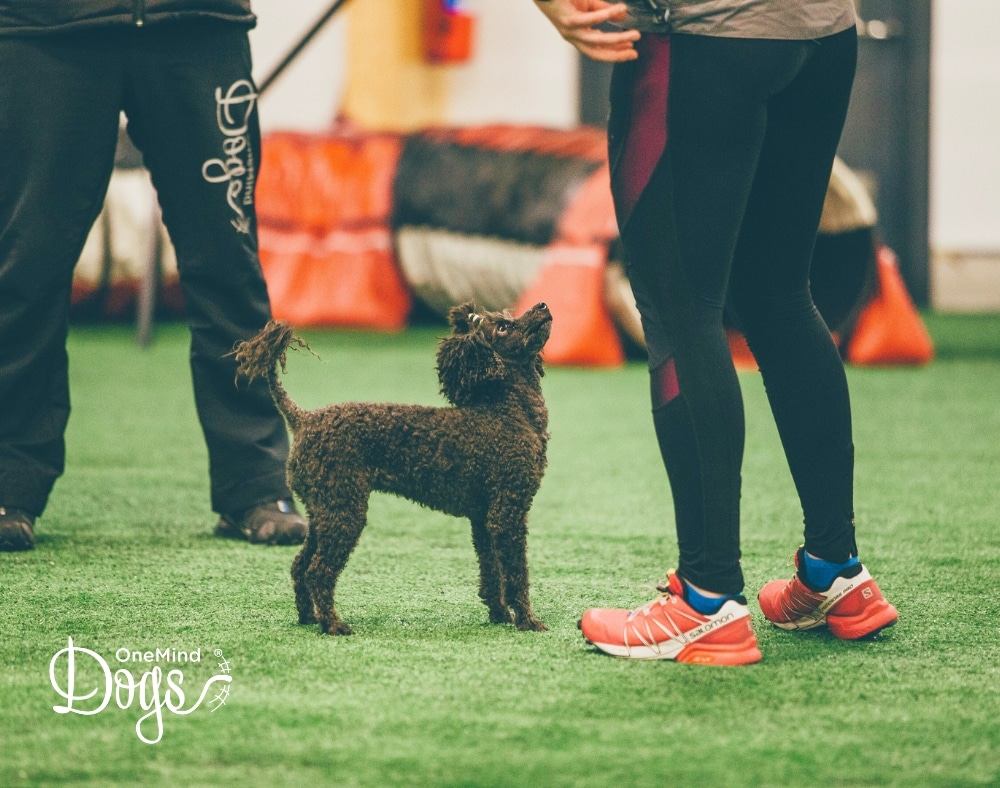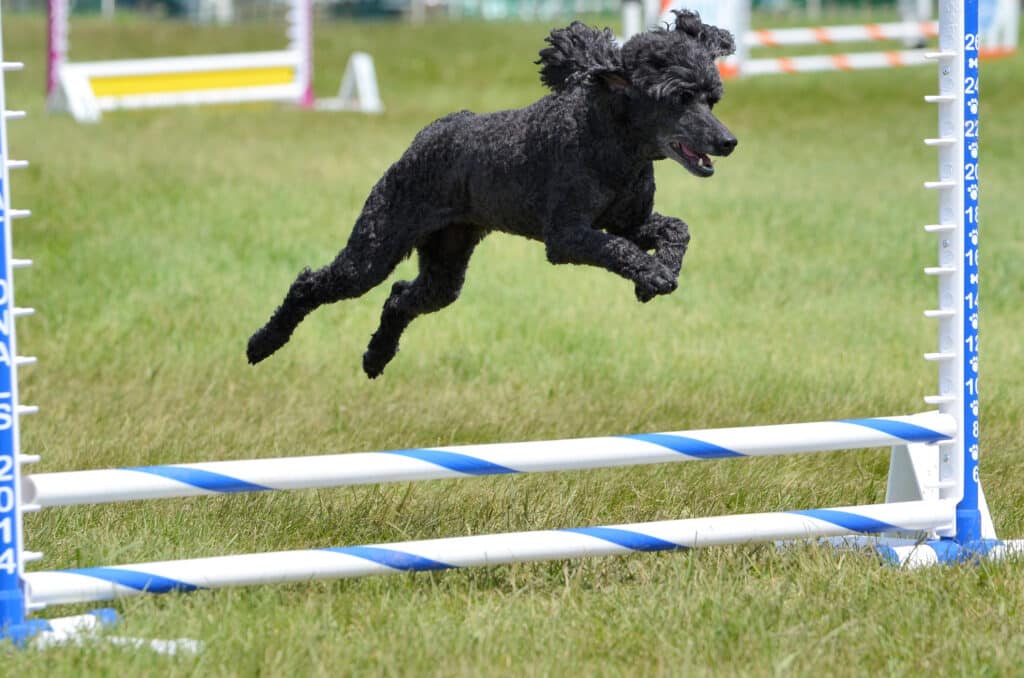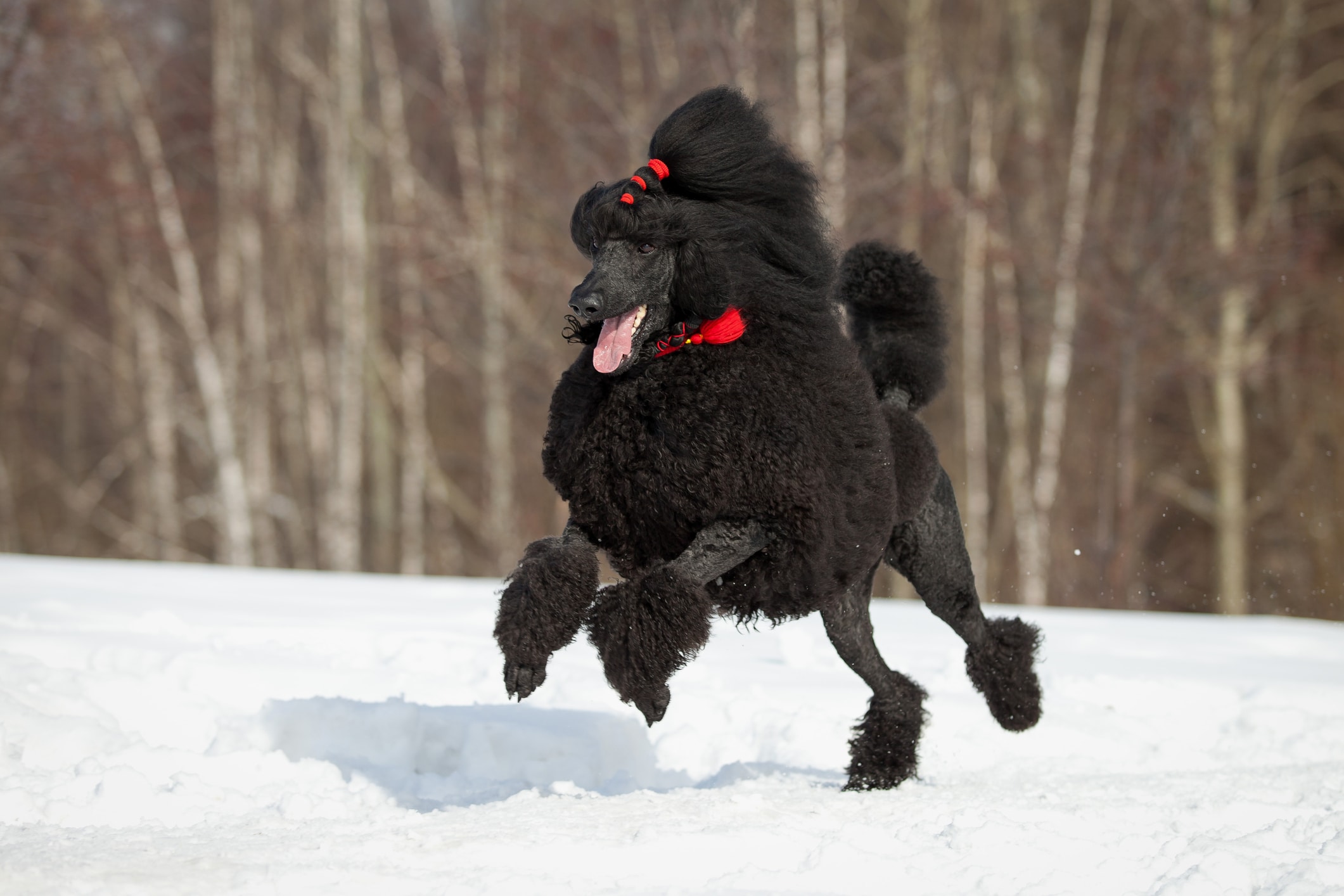Poodles are known for their intelligence, elegance, and agility. These traits make them highly trainable, but also require a thoughtful approach to ensure effective training. Whether you are looking to train a Toy, Miniature, or Standard Poodle, following these key steps will help you nurture a well-behaved , fulfilled and happy dog. If your goal is to build a connection with your dog and have a fun life together, this blog post is for you!
1. Understanding Your Poodle’s Perspective
One of the essential aspects of training your Poodle is understanding its perspective. Think of your reaction if someone gave you orders in a foreign language you didn’t speak. You’d be confused and possibly even a bit resistant, right? With time and patience, both parties can eventually understand each other. Similarly, it’s important to consider that your Poodle has a different understanding of the world than we do. For example, they communicate primarily through body language, which may seem strange for humans.
Using body language cues to communicate with your dog is much easier for them than teaching them to respond to human words. Gradually, your dog will pair your body language cues with the words you say at the same time, so they do learn to “speak human” eventually. Keeping this process in mind will help you be patient and effective in your training. If you feel like your dog doesn’t listen to you, try these tips.
Dogs are naturally social animals and thrive when surrounded by a loving and consistent family. In order to effectively train them, you must be aware of their needs and communicate clearly with them. At the same time, all dogs learn differently. When following a training program for your Poodle, keep their unique personalities in mind and tailor your training to suit them.
2. Train Your Poodle – Setting Your Dog Up For Success
Once you learn how to communicate effectively with your Poodle, it’s important to set them up for success in training. Just like humans, dogs thrive on consistency. Everything from your words to your tone of voice must be consistent and predictable for your dog. Consistency also extends to the timing of your training.
Mealtimes are a great opportunity to enforce good behavior. As you prepare your dog’s food, have them sit and stay in place until they’re ready for their meal. Your dog, being hungry, will be eager to please and will likely comply, which you can then reward with their meal. Or even better, break the meal up into portions and use them for simple and fun training exercises like these throughout the day.
This type of training is called positive reinforcement, and studies have shown that it is the most effective way to train dogs while building a strong bond. So, forget the yelling and rolled-up newspaper and only offer praise, treats and playtime when your Poodle does something right. Ten-minute sessions throughout the day should be enough to reinforce good behavior and get you both on the road to success.

3. Preventing Problems Before They Begin
Next, you’ll want to be proactive when you train your Poodle, by addressing potential issues before they have a chance to arise. For example, puppies love to chew and explore the world around them. It’s a genetic trait essential to their development as they learn how to interact with their environment.
Unfortunately, this need to chew can be problematic if your dog only has access to carpeting and furniture. Teach your dog what you expect them to chew by providing healthy alternatives like dog toys and treats. Reward them for choosing these options, and you’ll have less mess to clean up.
Note that you should manage your own expectations as well. It’s unlikely that a three-month-old puppy will show the same level of obedience as an adult dog. So, keep this in mind as you begin to train your pup, and be sure to reward them for their effort and enthusiasm rather than punish a lack of good behavior.
4. Mental and Physical Stimulation are the Key to a Happy Dog
Due to their high intelligence, Poodles need mental challenges to stay happy and well-behaved. Incorporate puzzle toys, interactive games, and fun training exercises like agility, that require problem-solving. Teaching your Poodle new tricks or advanced games can also provide the mental stimulation they crave.
Pro Tip: Rotate toys and games to keep things interesting for your Poodle. Introducing new challenges regularly can prevent boredom and undesirable behaviors.
Poodles, regardless of their size, need regular physical exercise to stay healthy and happy. Standard Poodles, in particular, have high energy levels and require more rigorous exercise routines. Regular walks, play sessions, and agility training can help meet their physical needs. Just ensure they are fully grown before adding exercises like jumps, weaves or climbing.
Pro Tip: Combine physical exercise with mental stimulation. Activities like Agility can double as both exercise and training sessions, keeping your Poodle physically fit and mentally sharp.

5. Teaching Your Poodle to Stay Home Alone
Separation anxiety is a very real and common fear in some dogs. If you have a dog prone to panic when left alone, the results can be destructive, ranging from excessive barking to destruction. In extreme cases, it can even lead to depression.
If you want your dog to be happy, it must learn how to be calm and content when left on its own. Start by creating a safe space your Poodle can call its own. It should include a comfortable bed, toys, and fresh water. It will give your dog a sense of security and make them less likely to feel anxious if you’re not around.
Train your dog to stay calmly in the space when you’re home, we explain how to do this in our online puppy training program. Gradually, extend how long your dog must stay in that space and reward them for staying calm in the private den. For example, you might send them there when guests arrive at your home and give them safe chews or food puzzles in there. As they learn to accept their space and relax, they’ll be more comfortable spending time there when you’re away. This training requires patience and consistency.
The Importance of Socialization
Socialization is crucial for all dogs and Poodles are no exception, especially given their sometimes reserved nature around strangers. Expose your Poodle to different environments, people, and other dogs from an early age. Teach them to ignore the distractions and focus on you instead, using treats, play and praise. This helps them develop into well-rounded and confident adults.
Pro Tip: Positive experiences are key. Ensure that socialization experiences are pleasant for your Poodle to build positive associations. If you dog is scared of other dogs, here are some tips.
Fun Facts About Poodles
- Hypoallergenic Coat: Poodles have a unique coat that sheds minimally, making them a popular choice for people with allergies.
- Versatile Performers: Historically, Poodles were used as circus performers due to their intelligence and trainability.
- Water Lovers: Poodles were originally bred as water retrievers, and many still enjoy swimming and water-based activities such as retrieve.
Conclusion
Training your Poodle is a rewarding experience that will lead to a strong connection between you both. By understanding their unique traits and incorporating mental stimulation, socialization, and regular exercise, you can ensure your Poodle grows into a well-behaved and happy companion. Start with these five key steps, and enjoy the journey together.





